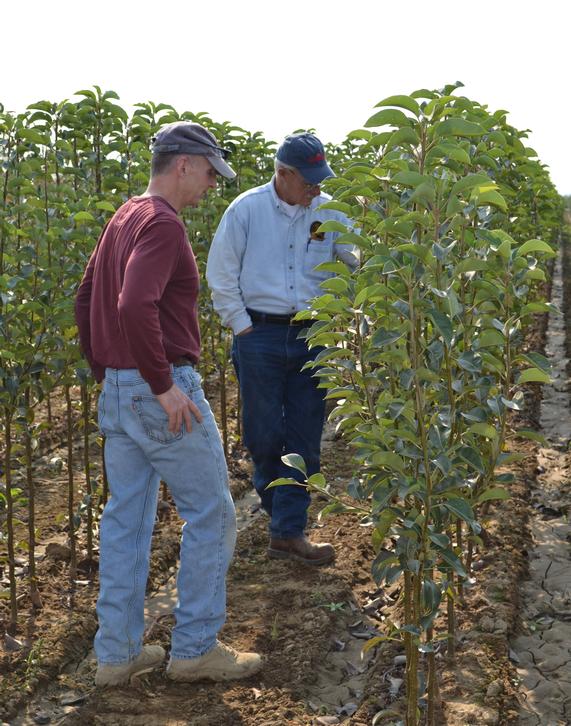Bareroot or Containerized
The "Short & Sweet" from Grandpa:
• Containerized trees are more readily available locally and can be planted almost anytime.
• Containerized trees will "jump start" your harvest by a year or two versus a bareroot tree.
• Containerized trees already have their initial training. • Fewer varieties and rootstock choices in containerized trees.
• UPS or FEDEX will deliver a bareroot fruit tree to your doorstep, but you will probably have to haul your containerized tree home yourself.
• If you have NO patience, then trade your hard earned money in on a balled and burlapped tree. Big bucks and good luck finding one. Grandpa hasn't yet figured out a way to ship and sell you one yet. WE NO LONGER CARRY CONTAINERIZED TREES - ONLY BAREROOT !
Grandpa's "long winded" answer: When Grandpa had orchards, he never heard about containerized fruit trees. He ordered from his trusted nursery and planted bareroot trees in the spring. It made the most economic sense for him and for commercial orchardists now, but, BYFGers have a choice.
Advantages of Containerized versus Bareroot:
• Good availability in the spring, summer and fall from your local independent garden centers.
• Can be successfully transplanted at any time of the year, even though Grandpa recommends planting only during months with an "r" in them.
• When shopping, you can get a good idea of the general health of the containerized tree.
• A good containerized fruit tree will have been established and grown long enough in the container that there will be little or no transplant "shock" when planted in the backyard orchard.
• You will often "jump start" your production and harvest by a year or more, because the fruit tree is older and more established, and because a little restricting of the root system in the container promotes earlier blooming and fruit set.
• A good containerized tree will have some initial training done to it, taking this chore out of establishing a backyard orchard.
Disadvantages:
• Usually fewer varieties to select from, because the garden center can't realistically carry scores of varieties.
• Usually no choice of rootstock--- often limited to semi-dwarf and standard trees.
• Hauling them home!
Advantages of Bareroot versus Containerized:
• You get to pick and select the exact variety you want from a bigger selection of varieties in the comfort of your own home.
• Easier and better availability of "dwarf" root instead of semi-dwarf.
• UPS or FEDEX delivers them right to your door!
Disadvantages:
• Only available during the spring.
• When they arrive, they should be planted right away.
• After planting, you must trim and train them so that they start growing properly.
• There is a slightly bigger chance of the tree failing to grow versus a container tree.
• It usually takes a year or more time to produce fruit than a container tree.
B & B Fruit Trees: Grandpa was a very patient person, and knew that you can't always rush Mother Nature. Small bareroot trees made economic sense in a commercial orchard setting, but most homeowners who want a backyard orchard are a little more impatient and want to pick fruit the next year and some want a larger tree than can be found in a container. Most containerized fruit trees will have a caliper at the bud union of around an inch. It will take several years to grow that into a nice specimen with a caliper of several inches and height and spread of 10 feet of so. If you are really impatient for a BIG tree, then your only recourse is to try and find a more mature tree that can be dug, balled and burlapped, and transplanted to your site.
• Expect to pay big bucks, if you are lucky to find any nursery with such large fruit trees.
• Expect little or no variety selection except for the few most popular varieties.
• Expect the tree to take at least one season or more to "recover" from transplant shock and really start to look healthy.
• On a positive note, because the tree is older it will probably have fruit already or will set fruit the first year--- "instant orchard".
